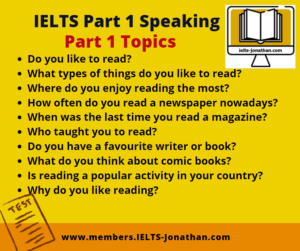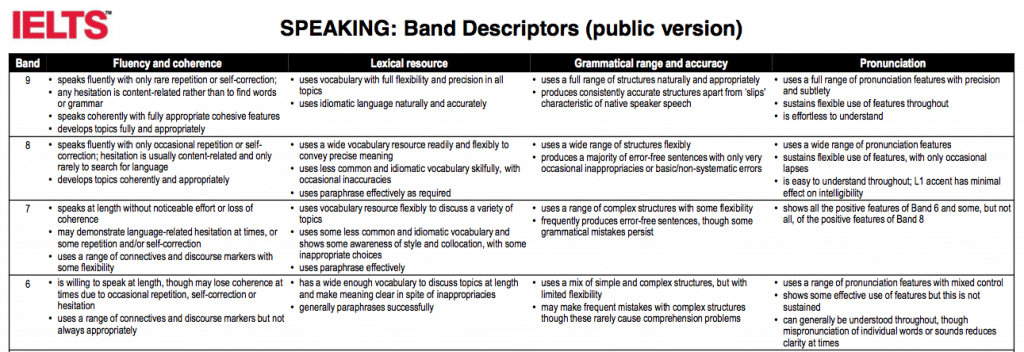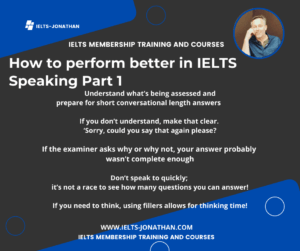How to answer Part 1, Practice Cards and Marking Criteria
As soon as the examiner says, ‘Good morning’ or ‘Good Afternoon’, the assessment in the speaking test begins.
It’s only natural to be nervous at this stage of the test, after all both the candidate and the examiner have only just met and are still assessing each other as individuals.
In many ways, IELTS speaking part 1 should be the easiest and least stressful part of the test but too often its not!
Candidates may speak too quickly, may hesitate too much or misunderstand the questions, can be sharply interrupted by the examiner or simply asked ‘why’ or ‘why not’.
All of these add to the pressure of the test!
Thankfully this unnecessary stress can usually be avoided by remembering a few basic rules and being aware of the assessment in this part of the IELTS test.
How to Respond and Practice for an IELTS Task 1 question
Part 1 questions consist of basic questions around mostly common but sometimes unusual topic areas.
Small talk
They can be compared to the kind of questions you might ask if you’re trying to get to know somebody.
The questions often generate short answer responses such as ‘yes’ and ‘no’ or nouns and noun phrases like ‘my mother’ ‘blue’ and ‘I was seven’.
Extending you answer
While it is perfectly natural to give short answers in ‘small talk’ or the ‘getting to know you stage‘, a mistake that’s often made is to give the most basic answer possible when it’s important to extend the answer.
If your answer is too short, the examiner will quickly ask you ‘why’ or ‘why not’.
This gets you, the candidate, to think more fully about the answers you could give.
Extending your answer in a normal conversation shows that you are interested.
Extending your answer displays the language you are capable of producing.
To do this in the speaking test you should typically extend your answer from 5 to 10 seconds, but not much more.
Answers that are very long or change the topic are not natural.
You also need to give the examiners the opportunity to ask a variety of questions.
Speaking for too long in ‘small talk’ has a negative effect and answers which change topic or are over-extended are quickly interrupted, so don’t try to speak for too long in Part 1.
Remember, this part of the test is
- to make your feel comfortable
- give the examiners a chance to think about your basic language level
- and mimics ‘small talk‘.
Look at these examples and notice how the answer displays your language ability without having a negative effect.
Do you read magazines?
I used to read magazines when I was younger, but now, with social media, I tend to read articles I find online. It’s easier to find something interesting to read and cheaper too.
Who taught you to read?
It was my mother who taught me to read in English. She would read English sentences to me and then I would read back to her. Of course, she taught me some Thai, but I learnt to read Thai properly at school.
When did you starting learning English?
I started learning English by myself using YouTube, but before that I had basic English lessons at school in year 5, so I was about 7.
What’s your favourite colour?
Oh, my favourite colour is blue, dark blue. It’s my favourite colour because it reminds me of the sea and the sky. It’s also a very calming colour which I like to wear. It makes me feel confident.
How to practice for Part 1 Speaking
You an practice by yourself or with partner to get some feedback.
Remember when practicing, it’s even better if you can record yourself to notice the language you use and any errors you make!
I use Flipgrid in my classes.
‘Flipgrid is a free video discussion platform from Microsoft where you can post discussion prompts and students respond with short videos, whether they are learning in class or at home.‘
It’s free and fun!
IELTS Speaking Criteria Explained
If you want to get a high score in the IELTS Speaking test, it is very important to understand how you will be assessed. This will help you to improve your speaking performance and maximise your score.
How are you assessed in the IELTS speaking test?
There are four IELTS speaking criteria:
- Fluency and Coherence (FC)
- Lexical Resource (LR)
- Grammatical Range and Accuracy (GRA)
- Pronunciation (P)
These four IELTS speaking criteria each relate to a different area of your spoken English skills:
Fluency and Coherence
- How easy is it for you to keep speaking?
- Do you pause or hesitate often when speaking?
- Do your ideas relate to the question?
- Can you link your ideas together?
- Can you explain what you mean, even if you forget the right word?
Lexical Resource
- How wide is your vocabulary?
- How accurately do you use words?
- Do you use collocations accurately?
- Do you use some less common words?
Grammatical Range and Accuracy
- Do you use a range of structures?
- Do you get the word order right?
- Do you use the right tense?
- How often do you make mistakes?
- Do your mistakes make it difficult to understand what you mean?
Pronunciation
- Do you speak clearly?
- How easy are you to understand?
- Do you use stress and intonation accurately?
- Do you use connected speech / link your words together?
You are given a band score in each of the four areas based on your performance across the whole speaking test.
It works like this:
A band score award in Fluency and Cohesion at 7, in Lexical Resource at 7, in Grammatical Range and Accuracy at 7 and in Pronunciation at 7 would give an overall IELTS Speaking Band Score of 7.
Here’s another example.
A band score award of 7, 7, 8 and 8 results in an overall IELTS Speaking Band Score of 7.5.
Likewise a band score award of 7, 7, 6 and 6 results in an overall IELTS Speaking Band Score of 6.5.
So, if you want to get Band 7 for speaking then you need to get 7 in each of the four IELTS speaking criteria.
Review of Part 1 Speaking Tips
So to recap, my Top Tips are:
- Understand what’s being assessed and prepare for short conversational length answers
- If you don’t understand, make that clear. ‘Sorry, could you say that again please?
- If the examiner asks why or why not. Your answer probably wasn’t complete enough
- Don’t speak to quickly; it’s not a race to see how many questions you can answer!
- If you need to think, using fillers allows for thinking time.
So, now you have a better idea of this part of the Speaking test, take a look at the most common categories below, and common topic related questions.
Practice them, and why not try using Flipgrid to improve your performance and your confidence.
Finally, there are some more challenging Task 1 questions at the end and links to some possible answers.
You can find plenty of other examples online, but be careful that they are realistic types of IELTS speaking questions.
IELTS Speaking Part 1 Questions
- Reading
- Television
- Work
- Family
- Sports
- Animals
- Technology
- Communication
- Health
- Food
- Travel
Decisions and choices
- Do you always make good decisions
- Do people find it easy to make choices in their daily life
- Have you regretted making a bad decision
- What would you do if you made a bad decision at work or school
Reading
- Do you like to read?
- What types of things do you like to read?
- Where do you enjoy reading the most?
- How often do you read a newspaper?
- When was the last time you read a magazine?
- Who taught you to read?
- Do you have a favourite writer or book?
- What do you think about comic books?
- Is reading a popular activity in your country?
- Why do you like reading?
Television
- Do you watch a lot of television?
- What programs do you enjoy the most? Why?
- Are there any programs that you dislike? Why?
- Which programs are the most popular with teenagers in your country?
- When was the last time you watched a cartoon?
- Are cartoons well-liked in your country?
- How often do you watch TV for the news or weather?
- Did you watch a lot of TV when you were a child?
- Did many of your friends have a TV in their bedroom?
- Does watching TV help you learn English?
Work
- Do you have a job?
- How far away is your workplace from your home?
- How long have you had this job?
- Did you have a part-time job when you were a child?
- What jobs do your parents have?
- What job do you think would be the most difficult?
- What do workers in your country like to do to relax after their workday?
- What career did you want when you were younger?
- Did you ever do charity work?
- What careers pay the highest salaries in your country?
Family
- How many people are there in your family?
- Do you live with your family?
- Did you spend a lot of time with your family when you were a child?
- Who are you closest to in your family?
- Do you prefer spending time with family or with friends?
- What things does your family do together?
- Did your parents ever have any hobbies when you were a child?
- Is family important in your country?
- Who cooks in your family?
- Where was the last place that you visited with your family?
Sports
- Do you do any kind of exercise?
- How often do you exercise or play sports?
- What kind of sports did you participate in when you were a child?
- Do you prefer to watch or play sports?
- What are the most popular sports among people in your country?
- What kind of sport would you like to try in the future?
- Do people in your country exercise more nowadays than they did in the past?
- Do you prefer team sports (football, volleyball, etc.) or individual sports (tennis, running, etc.)
- Are there many places to exercise in your hometown?
- Is swimming popular in your country?
Animals
- Do you like animals?
- What is your favourite animal?
- Did you like the same animal when you were a child?
- Have you ever had a pet?
- Which animals make the most popular pets in your country?
- Why do people like to keep pets?
- Which animals are important in your culture?
- Are there any animals that you are scared of?
- Would you like to own an unusual pet like a snake or a spider?
- Have you ever visited a zoo or wildlife reservation before?
Technology
- How often do you use a computer?
- Do you use a computer more for work, or for entertainment?
- Do you prefer to watch movies on a computer or in a cinema?
- How old were you when you got your first cell phone?
- How old were you when you got your first computer?
- Do you prefer to read from a book or on an e-reader?
- Did you ever use a computer to look up words in a dictionary?
- Who taught you how to use a computer?
- Do you usually use a camera or a cell phone to take pictures?
- Is there anything you don’t like about using a computer?
Communication
- Is it necessary these days for children to develop good handwriting skills?
- What kinds of communication are necessary at work?
- What are the benefits of reading books?
- Why are communication skills important?
- When you meet with your friends, what do you normally talk about?
- How do you usually keep in touch with members of your family?
- Do you prefer to speak to people by phone, by writing emails or sending text messages?
- Do you ever write letters by hand?
- Is there anything you dislike about smartphones?
- Do you think young children should learn to speak a foreign language at school?
Health
- Do you have any unhealthy habits?
- In what ways do you try to stay healthy?
- Is it easy to keep fit where you live?
- What do you think is more important, eating healthily or doing exercise?
- What are the health benefits of playing a sport?
- What is your favourite food to eat when you’re sick?
- What advice would you give to someone else to improve their heath?
- What is your favourite healthy food? Why do you like it?
- Where are the best places to exercise in the area where you live?
- Have you ever taken an exercise class at a gym or fitness centre? Did you like it?
Travel
- Do you like to travel?
- What kinds of places have you visited in your life?
- What places would you like to visit? Why?
- What’s the best place you’ve ever visited?
- How do you prefer to travel on long journeys?
- Do you prefer to travel with family or friends? Why?
- Do you like to stay in hotels?
- What is the best part about traveling to a new place?
- Is there a place that you do not want to visit?
- Do you think it is important to try the local cuisine when traveling to a new place?
Being on Time and Punctuality
Think about these questions, what answer can you give,
- How do you remind yourself to be on time?
- Why are some people always late?
- Do you think it is important to be punctual?
- What will you do if you are waiting for someone?
- Do you think people these days are as punctual as they were in the past?
Space Travel
Think about these questions, what answer can you give,
- Do you want to travel in the outer space?
- What would you do if you had that opportunity?
- Do you think it’s necessary to see other planets?
- When was the latest time you went travelling?
- Do you like to travel by air?
Plants and Gardening
Think about these questions, what answer can you give,
- Do you keep plants at home?
- Did you grow any plants when you were young?
- Do you know anything about growing a plant?
- Do people from your culture send plants as gifts?
Studying
Think about these questions, what answer can you give,
- What time do you like to study?
- What’s the best time for you to study?
- Do you like to study alone or with your friends?
- Who do you usually study with?
Foreign Food
Think about these questions, what answer can you give,
- Have you ever tried foreign food?
- Do you like to try new food?
- What kinds of new food have you tried recently?
- What kinds of foreign food are popular in your country?
- Do you like any food from the countries near your country?
Think about these questions, what answer can you give,
- Did you save money when you were young?
- Have you ever given money to other children?
- Do you think parents should teach children to save money?
- Do parents give children pocket money in your culture?
I’m Jonathan
I’ve taught IELTS and University English in more than a dozen universities and schools around the world.
I’m a parent, traveller and passionate about language teaching and helping students achieve their dreams.
Whilst living in Austria or working in Asia, I run IELTS courses to help students get to where they want to be.
If you are serious about IELTS, connect with me to see how I can help you.





